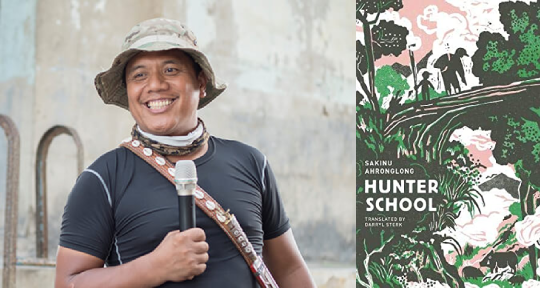Hunter School by Sakinu Ahronglong, translated from the Chinese by Darryl Sterk, Honford Star, 2020
“I’m dumb,” I told an editor to whom I had shown an essay. “I haven’t read much, and the things I write nobody reads. I can’t write essays like other people.”
“Sakinu, why would you want to be like anyone else?” she said. “Everything in you is literature, things other people don’t have and can’t imitate. Sakinu, let everyone know all the things you keep hidden, let your life story, and Paiwan history, come flowing out of your pen.”
Translation specializes in the improbable, bringing faraway stories to unlikely audiences. The English-language translation of Hunter School (superbly crafted by veteran translator Darryl Sterk) goes further than most in this regard, because although Hunter School was originally written in Chinese, the author has no Chinese heritage, and his people have until recently had no voice in the world of Chinese-language literature, despite being part of the Chinese world; his name is Sakinu Ahronglong, and he is an indigenous man of the Paiwan ethnicity.
Like all of Taiwan’s many indigenous ethnicities, the Paiwan are an Austronesian people more closely related to the Maori of New Zealand than to the Han Chinese who now compose the majority of Taiwan’s population. Though their voices have been marginalized, they remain inheritors of living wisdom, passed from mouth to ear for millennia. Now, Sakinu’s stories have made the quantum leap, first from fireside storytelling to Chinese text, then finally into English, and they are here to show us a new way to relate to our planet and to people who have lived closest to nature for the longest time. This book is a fighter. It had to be. It has fought its way tooth-and-claw through the brambles of oppression—cultural cleansing, intolerant Christians, economic exploitation, etc. etc.—and against all the odds, here it is.
Hunter School begins with the author, Sakinu Ahronglong, in school. Flying squirrel school. Getting to class isn’t a simple commute. Luckily, young Sakinu has a guide in the form of his father, a consummate hunter who holds deep compassion for the animals he meets on his forays, and who teaches Sakinu many things, like the names of the bigwigs in local monkey society. The early chapters are short, leading readers on a tour of Sakinu’s mountain forest childhood and his wilderness education. As the book progresses and Sakinu’s world expands, the chapters stay short. They weave a sequence of life stories, crossing and re-crossing the frontier between a wild ancestral homeland and modern life in a globalized, post-industrial country. In the wilderness, we get to know a world that, for all its wildness, is still very much lived-in (and has been for thousands of years before the Han Chinese arrived in Taiwan in the sixteenth century). These stories show us a new way of imagining the wild realms of mountain and forest, which many of us are only acquainted with (and fond of) from various ventures into the “backcountry.” Of course, it’s only the “backcountry” if you don’t live there. In these pages, we see how people like Sakinu’s grandfather used to live entirely civilized lives in the wild before the time when much of the world’s nature was cordoned off from human society, emptied of most of its indigenous residents, and divided up into national parks, commercial forestries, and mines. READ MORE…

